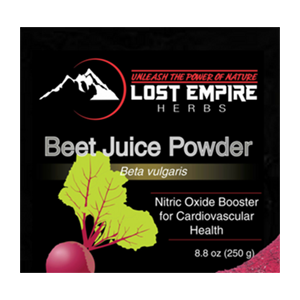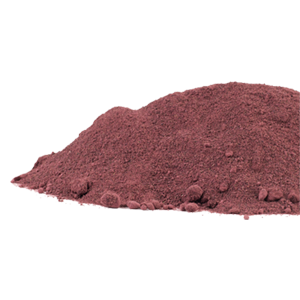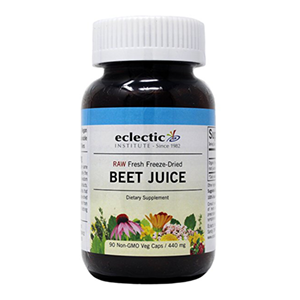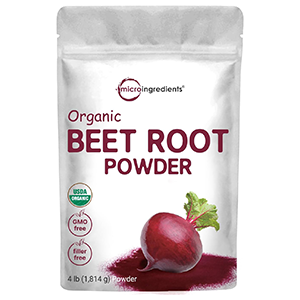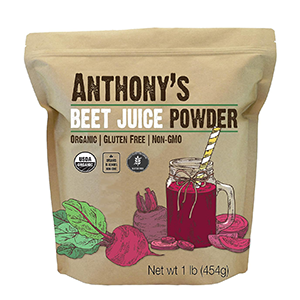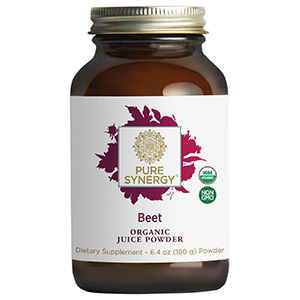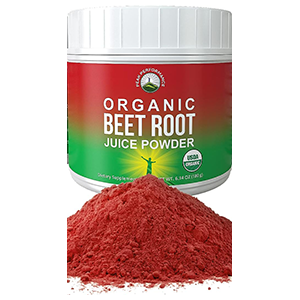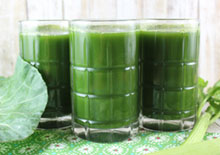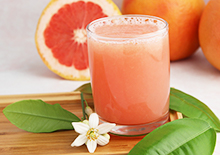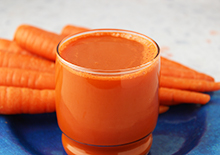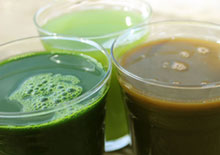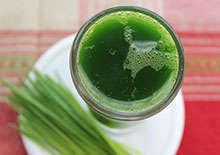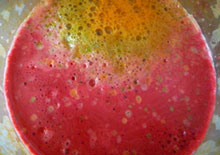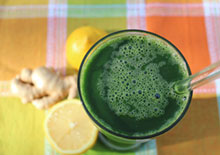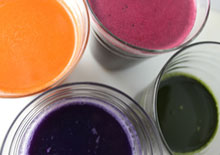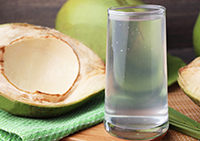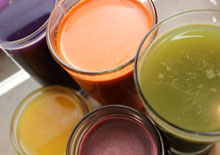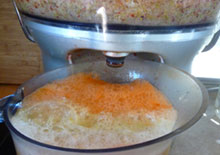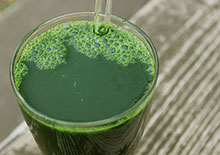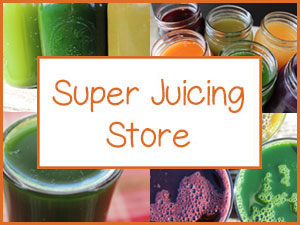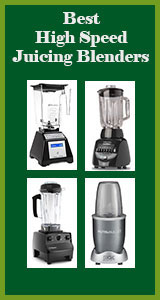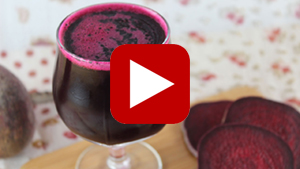- Home
- Super Juicing
- Beetroot Juice
Beetroot Juice and Powder, Potential for Enhanced Exercise Performance
Intro | Research on Beetroot Juice | Whole Beet and Beetroot Juice | Juice Vs Powder | How are Powders Made? | Whole Beetroot Benefits | How to Use | Precautions | Shop
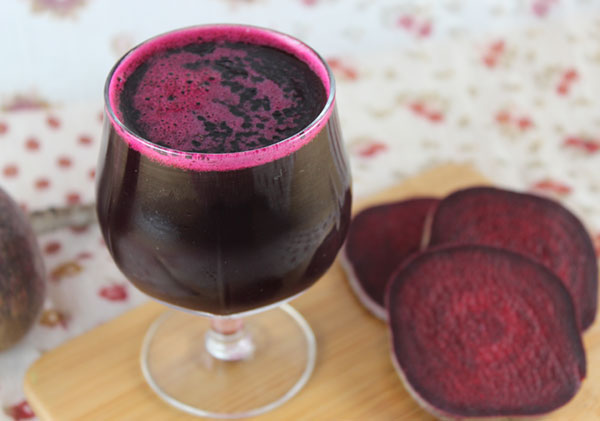
Beetroot juice is a concentrated vibrant magenta colored liquid that has in the last several decades been shown to have numerous health-enhancing properties which may be particularly beneficial to athletes as well as aerobic workouts.
Today it is often sold commercially as a sports drink or performance boosting energy supplement for this reason.
Table of Contents
Intro | Research on Beetroot Juice | Whole Beet and Beetroot Juice | Juice Vs Powder | How are Powders Made? | Whole Beetroot Benefits | How to Use | Precautions | Shop
Studied in recent years for its positive effects on the cardiovascular or circulatory system, red beetroot is known to be one of the richest sources of naturally occurring nitrates as well as betaines and other antioxidants like the betalain pigments, particularly betacyanin and betanin which give beets their deep red-purple color.
The inorganic whole food nitrates present in beets are not the same thing as synthetic sodium nitrate, a potential carcinogen, used as a food preservative in processed packaged meats.
Plant-derived nitrates in beets, taken up by the roots from the soils in which they grow, essentially convert to nitric oxide (NO) through the nitrate-nitrite-nitric oxide pathway after consumption. This NO boost is known to improve blood flow to the heart, brain and muscles, allowing for a more efficient use of oxygen.
Acting as a vasodilator, nitric oxide opens up or widens the blood vessels, an influence that can also innately lower blood pressure and/or help to maintain healthy levels.
Research on Beetroot Juice and Exercise Performance
Since one of the very first studies published in 2009 in the Journal of Applied Physiology, beetroot juice and its impacts on aerobic exercise and athletic performance have been extensively researched. (*)
It is identified to have a number of beneficial attributes shown to:
- Enhance exercise performance and tolerance
- Decrease oxygen cost when running and walking
- Significantly improve running performance
- Improve performance when cycling at high altitudes
- Positively affect performance of swimmers, reducing aerobic energy cost
- Improve aerobic endurance and blood pressure in elderly
- Exhibit potential to boost performance during repeated short-duration high-intensity exercise
- Enhance high-intensity intermittent exercise in professional soccer players
- May make it possible to enable increase time-to-exhaustion
Some research suggests that beet juice "should be initiated within 90 mins before athletic effort, since the peak value of NO3− occurs within 2–3 h after ingestion." (*)
Despite most scientific reports, there are a small number of studies that indicate that beetroot juice has a neutral effect on exercise performance. Therefore, other individual factors may also be involved such as current health conditions as well as levels of beneficial gut bacteria, which can play a role in the nitric oxide conversion process. (*)
It is also recognized that "supplementation with beetroot juice can be undermined by interaction with other supplements such as caffeine."
Beetroot juice based powders and capsules, are now widely available and relatively inexpensive, especially in comparison to synthetically manufactured "NO boosters", which can also have potential negative health consequences.
Nitrates are much more bioavailable in whole vegetables, especially beets but also are high in green leafy vegetables. In addition, the juicing process which eliminates fiber content also makes juices and powders created from the liquid more absorbable and readily available.
Beet juice and powders aren't just for athletes. Used in conjunction with a health promoting diet and lifestyle choices, they can be of benefit for other types of high-intensity aerobic exercise regimens, like cycling or running.
Taken as a natural energizer in the morning or throughout the day between meals, they offer additional qualities as a blood building and cleansing super juice concentrate.
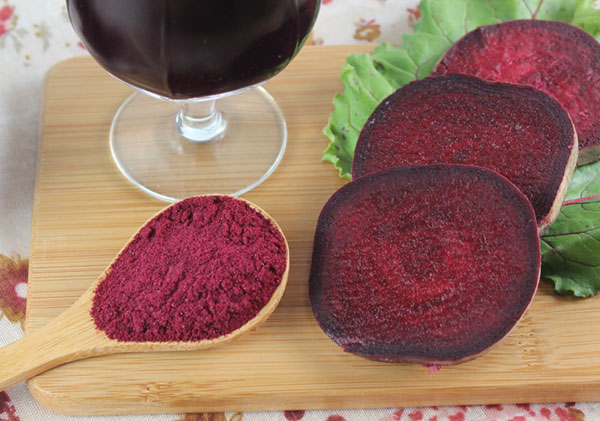
Whole Beet and Beetroot Juice
Of course, pressing your own raw beetroot juice is optimal for the highest quantity of nitrates and antioxidant-rich compounds. This is because juicing takes out the fiber and concentrates the nutritional components, making them more bioavailable for uptake by the body.
Keep in mind when purchasing beet juice sport drink "shots" or pre-made juices, most all are pasteurized which destroys valuable nutrients and enzymes. These commercial products can also contain other filler juices and/or added ingredients like synthetic vitamins.
Beetroot Juice Vs. Beet Juice Powder
While there is nothing quite like freshly pressed enzyme-rich beetroot juice, beet juice powders are also a good alternative. Like many superfood powders and extracts they are simply more convenient to use for many modern-day lifestyles.
A somewhat recent invention, beet juice powders are more frequently available as a loose powder, but some brands do offer capsules for ease of use.
Even though powders have invariably lost some nutritional value, compared to freshly juiced beets, they are much more concentrated than the juiced liquid.
What is the taste difference between the juice and the powder? Straight beetroot juice tends to have a thicker quality compared to the water dissolved powders, but the flavor has the same sweet earthy taste.
If you're not so into the flavor of beets, another good thing about the powders is that you can also add them easily to other drinks, like pre-workout protein shakes.
How are Beet Juice Powders Made?
"Beet juice" powders are made from
the juice itself rather than ground dried beetroot. This method is
achieved by cold-pressing the juice and then using low temp drying or
processing methods to preserve the greatest amount of nutrients.
There are usually two varieties:
- Bulk Juice Powders
- Freeze-Dried Juice Powders
Both types easily dissolve into water for an instant beetroot juice. Freeze-dried powders tend to have a longer shelf life.
It is important to always select quality powders made from certified organic beets as conventionally grown root vegetables can tend to concentrate chemicals and pesticides used.
Dried Beet Powder:
The other type of beet powder is made from straight ground beets. This variety, although considerably less nutrient-rich, contains dietary fiber which can have less of a spike on blood sugar levels.
Whole Beetroot Consumption, Also Researched Beneficial
Of course, you are going to get some benefits from adding more red beets to your diet. Raw beets are much better than cooked as there is less nutrient loss. They are good sources of folate, manganese and potassium as well as include moderate amounts of vitamin C and iron content.
The idea with consuming straight juice or powdered concentrates is that you are getting a much higher dose of beneficial compounds, like nitrates and betaines, than you would normally get by eating a smaller amount of beets directly.
However, in some research, whole beetroots were in fact shown to significantly improve running performance. (*)
Raw beets can be grated into salads, fermented or used in raw blended energy soups or beet borscht.
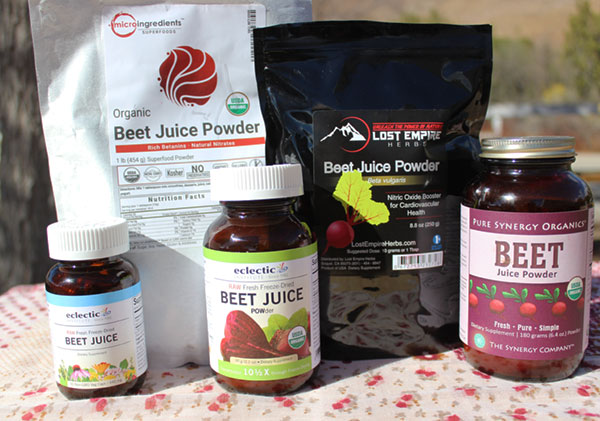
How to Use
Beetroot juice and water dissolved powders should be consumed on an empty stomach or between meals for optimal nutrient uptake.
As mentioned, there is a lot of sugar content in juices or powdered juice concentrates which tend to condense the already high sweetness of the red beetroot.
A good way to balance this out is to add vegetables, like kale, cilantro, parsley, cucumber and celery, when juicing or likewise dissolve the beet powders in water along with spirulina, moringa or other green powders.
Beet juice powders can also be incorporated into the diet as a food condiment sprinkled on salads or meals.
Beet juice powder dosage can vary from person to person and health goals. Generally, between 1-2 teaspoons mixed into water is considered a good dose level.
A one tablespoon dose "shot" consumed 90 minutes before exercise is often the amount recommended for athletes or high-intensity aerobic workouts.
Precautions:
We wouldn't necessary recommend beetroot juice on a low-sugar diet. Seek the advice of your physician before supplementing with beet juice if you are pregnant, nursing, have a serious medical condition, have diabetes, high blood pressure or are taking prescription medications. High amounts of beetroot juice may turn the urine or stools a red color. Because beets are high in oxalates, concentrated amounts should be avoided by individuals with kidney stones.
Shop Related Products (About Affiliates & Amazon Associate Paid Links)
Affiliate Disclaimer: This section contains affiliate product links. If you make a purchase through our recommended links, we receive a small commission at no additional cost to you. Thanks for the support.

